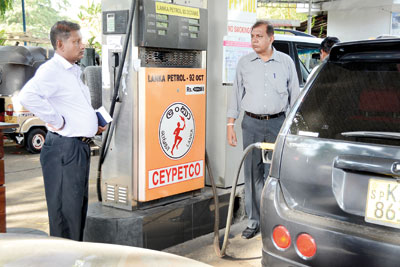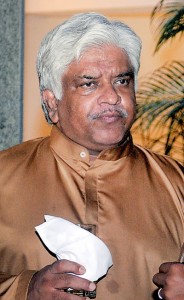News
Brakes on bid to hike fuel prices, minister pushes for price formula
The continued delay in implementing an independent fuel pricing formula threatens to plunge the Ceylon Petroleum Corporation (CPC) into further crisis, Minister of Petroleum Resources Development Arjuna Ranatunga has warned.

The country’s motorists consume around 130 million litres of petrol a month. Pic by Indika Handuwala
His remarks came against the backdrop of an announcement by the Lanka Indian Oil Company (LIOC) that it intends to effect a price hike this month.
The Minister said the CPC hoped to sell fuel at subsidised prices even if the LIOC raised its prices. He however, said this might not be feasible in the long term.
“The LIOC discussed the matter with the Treasury and with me. We requested it not to increase prices at this time,” the Minister said. He warned that if LIOC were to increase prices, the CPC would suffer further losses as more consumers would buy the CPC’s subsidised fuel.
Acknowledged that a hike in fuel prices would have a knock-on effect on the cost of living, the minister said, “Everything from transport to the packet of rice-and-curry and tea will increase, if fuel prices are increased. That’s why we are trying not to do this now.”
However, the minister said he would discuss the matter with the President and the Prime Minister, if the Government was determined to go ahead with the price hike.
When asked why the much-talked-about price formula had still not been worked out, Minister Ranatunga said the formula had been discussed extensively at the Cabinet and other institutions, but the progress had been frustratingly slow. “This is not something we alone can do. The Government needs to appoint a committee of experts. We are prepared to help,” he said.
He insisted that an independent price formula, which would ensure that fuel prices increase and decrease in line with world oil prices, was essential for institutions such as the CPC to survive.
“The CPC is suffering massive losses in the sale of kerosene and diesel,” Minister Ranatunga said, referring to the huge subsidy content in the prices.
In addition, the CPC also had been burdened with an excess of staff. “We can maintain an oil refinery with 250-300 staff, but we have a staff of nearly 1,500.”
The new Government, soon after it came to power in January, 2015, reduced fuel prices considerably. The price of a litre of 92-octane petrol was reduced from Rs. 150 to Rs. 117 while the price of 95-octane petrol came down from Rs. 158 to Rs. 128.

Arjuna Ranatunga
Lanka auto diesel which was sold at Rs. 111 a litre was reduced to Rs. 95 while the price of a litre of super diesel dropped from Rs.138 Rs.110. The price of a litre of kerosene was reduced from Rs. 81 to Rs. 65.
Minister Ranatunga said he hoped to present a Cabinet memorandum, explaining how much of an impact the 2015 price reduction had on the CPC.
There was no need to make the CPC into a profit making entity since its main objective was service to the people and providing them relief, the Minister said. But it must do its utmost to minimise losses.
The Government, meanwhile, has appealed to the LIOC not to increase the prices. The company said it was willing to consider the appeal, provided the Government restored the excise duty to Rs. 13 a litre of diesel as it was in August last year.
The excise duty was increased but there was no corresponding price increase and this resulted in the CPC and the LIOC incurring severe losses.
The LIOC has asked the Government to roll back the excise duty if it doesn’t want a price hike, the company’s Senior Vice President S. Agarwal said.
He said a top management committee was reviewing the mater while the company was awaiting the Government’s response.
The Government already charges an excise duty of Rs. 45 a litre for petrol. In light of all this, a private company cannot continue to absorb drastic losses without taking measures to reduce them, the LIOC official pointed out.
While the Government has not released data regarding losses to the industry in underpricing petrol and diesel, JB Securities Pvt Ltd, a Colombo-based research house and an equity brokerage, said in July this year that on a per-litre basis petrol retails at Rs. 117, of which taxes accounted for Rs. 56.50. The country’s motorists consume around 130 million litres a month. Therefore, even at reduced world market prices the loss to the industry due to under recovery of taxes is Rs. 1.04 billion a month. If the current trend holds it works out to Rs. 12.48 billion a year, the research firm said.
On a per-litre basis diesel retails at Rs. 95, and taxes are about Rs. 29.50. The country consumes around 200 million litres a month and at the current reduced world market prices the loss to the industry due to under recovery of taxes is Rs. 90 million a month.

